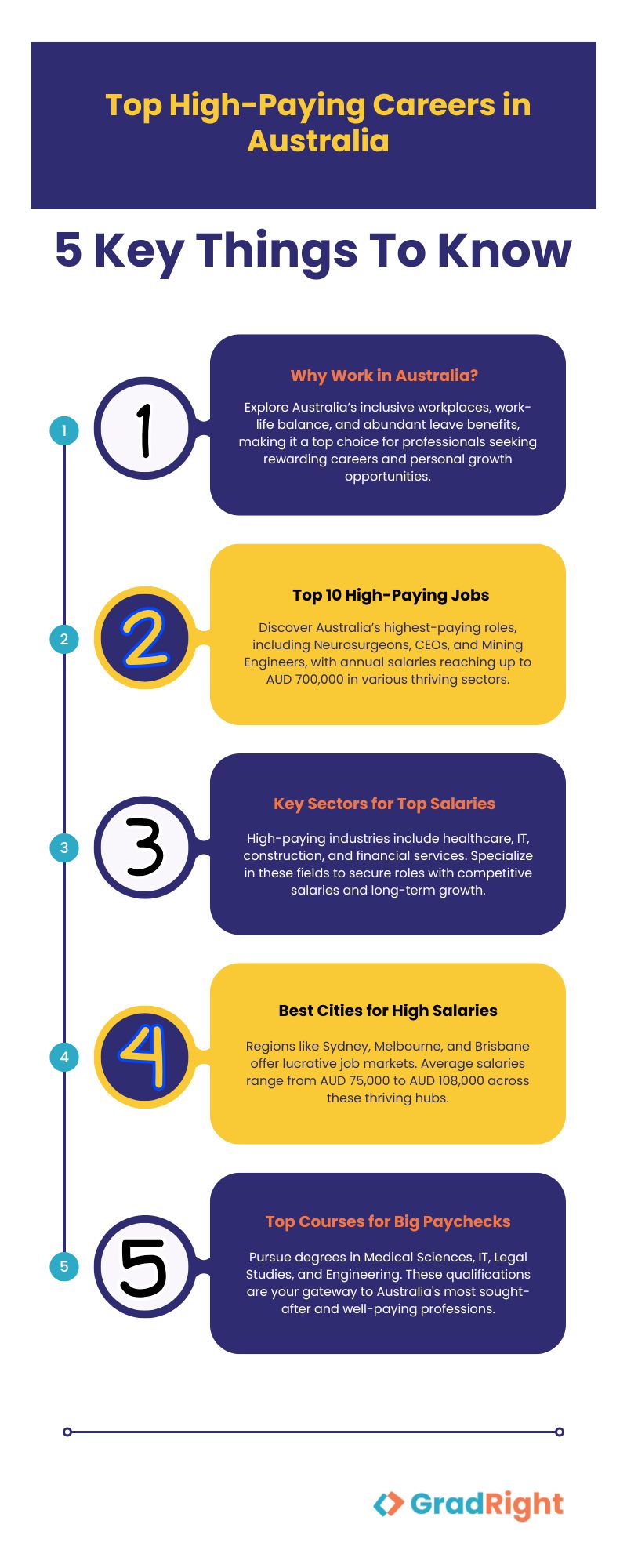Highest Paying Jobs in Australia: Top Careers with Excellent Salaries
Australia consistently ranks among the top countries for quality of life, thanks to its robust healthcare system, excellent educational opportunities, strong economy, and stunning natural environment.
The country’s economy hit $1.802 trillion in 2024 when major economies of the world were grappling with the global recession and slow economic growth. In October 2024, the employment increased to 14,537,500. Meanwhile, full-time employment increased by 9,700 to 10,037,700 people, and part-time employment increased by 6,200 to 4,499,800. There’s still increased demand in various industries.
In addition to offering excellent employment opportunities, it houses consistently ranked universities that have a solid reputation for placing students each year in high-paying job roles at top companies.
Therefore, the combination of Australia’s robust economy and its excellent educational system fosters a culture in which work and education are tightly related.
In this guide, we will be looking at some of the highest-paying jobs along with professional fields that have the highest earning potential in Australia and are expected to grow more in the upcoming years.
Let’s start by understanding why working in Australia can be such a great and rewarding experience for international students.

Why work in Australia?
Australia facilitates a good balance between professional and personal growth for workers. It offers good salaries, job security, work-life balance, and, most importantly, workplace empowerment.
Australia ranks 11th in the world on the Global Gender Gap Index, and despite ranking in such an esteemed position, the country still remains committed to closing the gap at work.
This is quite evident by its enforcement of robust anti-discrimination laws and other proactive initiatives by the Australian Human Rights Commission, as well as continuous efforts to promote gender equity through workplace policies that ensure equal opportunities and fair treatment for all employees.
Here are some more reasons why Australia could be the perfect choice for you to fulfill your career aspirations:
-
Amazing Work-Life Balance
In Australia, people take work-life balance very seriously. In the OECD 2023 report, Australia was ranked seventh in terms of work-life balance. It stated that 70% of employees were satisfied with their work timings. This means you will have plenty of time to focus on other things, including your personal life, even when you are in a high-paying job role in Australia.
The regular working hours for people in Australia are 9 am to 5 pm, with a 30-minute lunch break. This can be a huge attraction for students who believe in finding a balance between professional growth and personal life.
-
Inclusive Workplaces and Enhanced Exposure
Workplaces in Australia are, indeed, among the most diverse in the world. It has a multicultural environment, which allows people to share multiple ideas that originate from different social and professional contexts.
According to the Department of Australian Foreign Affairs and Trade, by the end of 2027, the country is striving towards achieving the highest inclusive work culture.
All of these potential benefits are masked by almost 30% of the workforce being foreign-born and providing a wealth of ideas and life experiences to share.
This isn’t just about representation—Australian companies actively promote inclusivity as a driver of innovation and success.
-
Abundant Leave Benefits
Australia is committed to principles of ethical and equitable employment. The Fair Work Act 2009 specifically forbids discrimination on the grounds of race, sex, and age. Under this law, employers strive to keep inclusive and respectful with fairness and mutual respect for all employees.
-
Promoting Equity and Fairness at Work
Australia is dedicated to maintaining an ethical and equitable workplace. Discrimination on the basis of any factor, such as race, gender, and age, is strictly outlawed by Fair Work Act 2009. Equally, the employer has the duty to create a fair, safe, inclusive, and respectful environment where all employees are treated with fairness and respect.
Now, let’s explore the industries and roles with the highest earning potential in this thriving economy.
Top 10 highest paying jobs in Australia
Australia is home to the best companies in the world, such as Deloitte, Google, and CSL, which offer a huge number of high-paying job options. Here is a table that lists the top 10 best jobs in Australia, along with their annual salaries.
| Profession | Average Annual Salary (AUD) |
| Neurosurgeon | $604,582 |
| Anaesthetist | $426,894 |
| Internal Medicine Specialist | $334,267 |
| Psychiatrist | $270,412 |
| Financial Dealer | $341,789 |
| Chief Executive Officer (CEO) | Up to $700,000 |
| Mining Engineer | $150,868 |
| Construction Manager | Up to $320,000 |
| Information Technology (IT) Manager | $130,797 |
| General Practitioner (GP) | $245,357 |
Highest paying jobs in Australia: Top sectors
Here’s an overview of the highest-paying jobs and the industries where these jobs are available.
| Sector | Job roles | Average Salary (AUD) per annum |
| Healthcare | Surgeon, Anaesthetist | AUD 500,000, AUD 405,000 |
| IT | IT Project Manager, Cyber security associate | AUD 300,000, AUD 280,000 |
| Construction | Construction Manager, Design Manager | AUD 250,000, AUD $320,000 |
| Financial Services | Financial controller, Commercial director | AUD 400,000, AUD 380,000 |
| Legal Services | Trial lawyers, Tax attorneys | AUD 200,000, AUD 850,000 |
So specializing in these sectors can open doors to a great earning potential. Let us see some of the most popular courses that are highly ranked and pursued by students worldwide.
Highest paying courses in Australia
Australia is a leading education hub which attracts students from over 140 countries.
Due to its excellent universities and a strong labor market that’s worth AUD 40 billion of economic output every year, the country offers the highest-paying courses.
But to land these jobs, you’ll require the right qualifications. So, some of the highest-paying courses in Australia are:
Medical Sciences
Within the medical Sciences stream, the most renowned courses are Doctor of Medicine, Master of Public Health, and Bachelor of Medical Science.
IT
The IT field is also growing profusely in Australia, which opens many career opportunities for students in this field. Some of the popular courses within this field are Bachelor of Information Technology, Master of Cyber Security, and Bachelor of Software Engineering.
Manufacturing Engineering
Australia has multiple technological industries that demand civil, electrical, and manufacturing engineers. Hence, some of the popular courses within this industry are Bachelor of Engineering (Mechanical, Civil, Electrical), Master in Supply Chain Management, and Master of Engineering Science.
Legal Studies
Legal studies are also highly regarded in the USA; hence, legal courses such as Juris Doctor, Master of Laws, and Bachelor of Laws are a great choice for students.
Professional Management
Some of the professional management courses are also worth doing because of their high demand in almost every industry in Australia. These courses include Master of Business Administration (Marketing, Finance, HR), Bachelor of Business, and Master of Project Management.
To land one of these high-paying jobs, you’ll need the right qualifications, which are doable and give higher ROI compared to other courses in Australia.
Top regions for high paying jobs in Australia
Although Australia as a whole has a very good range of jobs, certain cities are notable for high wages and employment.
In 2023, Australia was home to five universities ranked in the top 50 globally, including the University of Melbourne and the Australian National University, which are known for producing graduates who secure some of the highest-paying jobs.
Below are the leading areas from where one can look for the best-wage jobs.
| City/Region | Average Salary (AUD) |
| New South Wales | AUD 84,000 |
| Sydney | AUD 82,000 to AUD 108,000 |
| Melbourne | AUD 89,000 |
| Brisbane | AUD 75,000 |
| Canberra | AUD 85,000 to AUD 105,000 |
Note: These figures represent the average salary across all industry domains and may vary depending on the specific field.
Best paying jobs in Australia without a degree
Not all high-paying jobs require a degree. If you have the required level of skills and experience, then you can also find a high-paying job in Australia in 2025. Here are some top-paying jobs that don’t require a formal degree:
| Job | Average Salary (AUD) |
| Project Manager | AUD 100,000 |
| Safety Consultant | AUD 95,000 |
| Creative Designer | AUD 86,000 |
| Office Manager | AUD 85,000 |
| Social Media Manager | AUD 82,000 |
To get these jobs, you must have the right skills and, most importantly, the right amount of experience over formal education. Then, you can access these jobs as professionals.
To land one of these high-paying jobs in Australia, choosing the right university is crucial. You need to consider factors like strong placement records, companies hiring from your field of interest, and a robust alumni network. However, most students only rely on rankings, which don’t always reflect what’s best for your unique goals. This is where GradRight’s university-search platform can make a difference.
GradRight provides data-driven insights and tailored university recommendations that go beyond rankings:
- Personalized suggestions based on your profile, career aspirations, and academic goals.
- ROI-focused insights, including placement rates, alumni success stories, and hiring companies.
- Match scores to objectively compare universities.
- Fundable shortlists, ensuring your choices align with financing options.
By using GradRight, you’ll make a confident and informed choice about the university that best sets you up for success.
The next milestone is finding the right education loan with low interest rates and flexible terms to finance your program. This is where GradRight’s loan-search platform steps in.
GradRight’s loan-search platform connects you with over 15 trusted lenders, ensuring you get the best loan terms tailored to your needs:
- Competitive interest rates as lenders bid on your profile.
- Collateral-free and cosigner-free loan options.
- Quick and secure process—no paperwork, no bank visits.
- Tailored solutions designed for your financial situation.
- Fast disbursement, so you can focus on your education.
With GradRight’s university-search platform and loan-search platform, you’ll have the clarity and financial support to pursue your dream career in Australia.
Visa requirements for high-paying jobs in Australia
Australia is one of the most sought-after professional destinations, with attractive high salaries and high quality of life. Securing a visa is a very important part of working in Australia.
Here are the types of visas you can apply for:
- Temporary Graduate Visa (Subclass 485)
- Skilled Recognised Graduate Visa (Subclass 476)
- Temporary Skill Shortage (TSS) Visa (Subclass 482)
- Skilled Nominated Visa (Subclass 190)
Each visa has specific eligibility requirements, but they generally focus on factors like your professional skills, education, work experience, language proficiency, and, in some cases, sponsorship by an employer or state.
Be sure to explore the detailed criteria for the visa that best fits your circumstances and career goals.
Documents required to work in Australia
If you’re willing to study in Australia, then you need to have these essential documents to be able to apply for high-paying jobs. Here’s the list of documents
- National Identity Card
- A proper national ID card (e.g., an Aadhar card for Indian subjects) is needed.
- Passport
- An active national passport
- Work Visa
- A compulsory active work visa
- Skill Documents
FAQs
1. What is the GPA grading system in Canada?
In the country of Canada, the Grade Point Average (GPA) system is used to evaluate academic performance. Although grading scales may differ from province to province and institution, most universities use a 4.0 grading scale, in which letter grades equate to point values. For instance, an A+ is regarded as 4.0, an A as 4.0, and an A- as 3.7.
2. How do I calculate my GPA in Canada?
To calculate your GPA in Canada, you first have to convert each of your course grades to grade points and then multiply that grade point for each course by the number of credit hours the course is worth.
Then, add up all the grade points and all the credit hours separately and finally divide the total grade points/ or sum by the total credit hours.
For example, if you have three courses with the following grades and credit hours:
- Course 1: A (4.0) × 3 credits = 12.0
- Course 2: B+ (3.3) × 4 credits = 13.2
- Course 3: B (3.0) × 3 credits = 9.0
Total grade points = 12.0 + 13.2 + 9.0 = 34.2
Total credit hours = 3 + 4 + 3 = 10
GPA = 34.2 ÷ 10 = 3.42
3. What is an 80% in the GPA in Canada?
An 80% grade in Canada typically means an A- letter grade, which is equivalent to a 3.7 on the 4.0 GPA scale. However, grading scales can differ between institutions, so it’s advisable to consult your specific university’s grading policies.
4. How do you convert Indian grade to Canadian GPA?
You can convert Indian grades to the Canadian GPA system by following these steps:
- Understand the Indian Grading System: Indian universities often use a percentage system with classifications such as First Division, Second Division, etc.
- Map Percentages to Canadian Grades: Align your percentage scores with the corresponding Canadian letter grades. For instance, a First Division (typically 60-100%) may correspond to an A or A+ in Canada.
- Assign Grade Points: Convert these letter grades to the Canadian GPA scale.
- Calculate GPA: Use the method outlined in question 2 to compute your GPA.


















